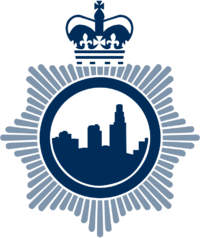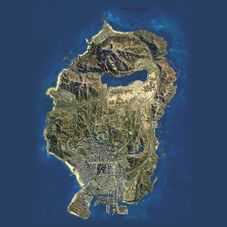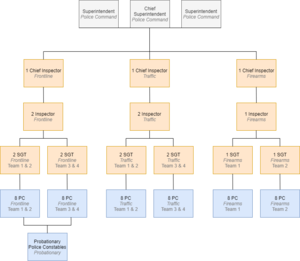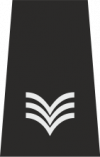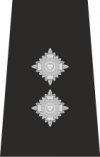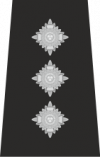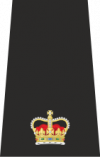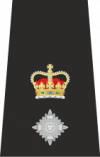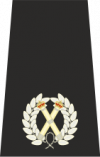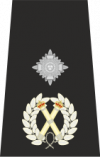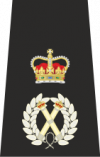Difference between revisions of "GTA:Los Santos Police Service"
Ace J Hunter (talk | contribs) m (Added word) |
Ace J Hunter (talk | contribs) (Fixed links and added callsigns) |
||
| Line 4: | Line 4: | ||
== Operational Structure == | == Operational Structure == | ||
The Los Santos Police Service is organised into the following directorates: | The Los Santos Police Service is organised into the following directorates: | ||
* Frontline Policing | * [[GTA:Los Santos Police Service#Frontline Policing|Frontline Policing]] | ||
* Traffic Policing | * [[GTA:Los Santos Police Service#Traffic Policing|Traffic Policing]] | ||
* Specialist Operations (Firearms) | * [[GTA:Los Santos Police Service#Specialist Operations|Specialist Operations (Firearms)]] | ||
Each directorate is made up of 25 officers, with the exception of Specialist Operations which has 15. Each directorate has 4 operational teams consisting of Sergreants and Police Constables.[[File:GTA Police Structure.png|thumb|Police Structure]] | Each directorate is made up of 25 officers, with the exception of Specialist Operations which has 15. Each directorate has 4 operational teams consisting of Sergreants and Police Constables.[[File:GTA Police Structure.png|thumb|Police Structure]] | ||
| Line 33: | Line 33: | ||
=== Frontline Policing === | === Frontline Policing === | ||
Frontline policing officers perform standard patrols around the Los Santos area whilst responding to incidents and 999 calls. They ustilise Incident Response Vehicles and Area Cars. | Frontline policing officers perform standard patrols around the Los Santos area whilst responding to incidents and 999 calls. They ustilise Incident Response Vehicles and Area Cars. Each vehilce performing frontline policing duties is assigned the Yankee-Victor callsign with a number attached. | ||
=== Traffic Policing === | === Traffic Policing === | ||
Traffic Policing officers are specially trained in enforcing road traffic laws and high speed pursuits. They are also trained in tactical pursuit tactics such as TPACs and Hard Stops in order to prevent offenders who attempt to escape via the roads. They utilise Traffic Pursuit Vehicles. | Traffic Policing officers are specially trained in enforcing road traffic laws and high speed pursuits. They are also trained in tactical pursuit tactics such as TPACs and Hard Stops in order to prevent offenders who attempt to escape via the roads. They utilise Traffic Pursuit Vehicles. Each vehilce performing traffic policing duties is assigned the Tango-Romeo callsign with a number attached. | ||
=== Specialist Operations === | === Specialist Operations === | ||
Specialist Operations officers receive additional training in order to utilise firearms. Officers in this directorate consist of Authorised Firearms Officers (AFO) and Specialist Firearms Officers (SFO). They utilise Armed Response Vehicles (ARV) in Tactical Support Teams (TST) to respond to firearms and violent crime incidents, as well as working as trojan proactive units as visible armed response vehicle patrols in areas of high crime to deter those who pose a threat. | Specialist Operations officers receive additional training in order to utilise firearms. Officers in this directorate consist of Authorised Firearms Officers (AFO) and Specialist Firearms Officers (SFO). They utilise Armed Response Vehicles (ARV) in Tactical Support Teams (TST) to respond to firearms and violent crime incidents, as well as working as trojan proactive units as visible armed response vehicle patrols in areas of high crime to deter those who pose a threat. Each vehilce performing specialist operations duties is assigned the Oscar-November callsign with a number attached. | ||
== Ranks == | == Ranks == | ||
The Los Santos Police Service uses the standard British Police [[Police Ranks and Structure|ranks]], indicated by shoulder boards (epaulettes), up to | The Los Santos Police Service uses the standard British Police [[Police Ranks and Structure|ranks]], indicated by shoulder boards (epaulettes), up to Chief Constable. | ||
Following controversy over various Police Complaints where officers refused to identify themselves by name, and a statement by CC [[User:Tadworth|Tadworth]] in early 2016 that "the public has a right to be able to identify any uniformed officer whilst performing their duty", collar numbers were introduced. They are allocated individually to each officer, who must tell you their collar number except in a small amount of specific circumstances. Every officer (except those that are masked or plain clothed) is required to display their collar number at all times. | Following controversy over various Police Complaints where officers refused to identify themselves by name, and a statement by CC [[User:Tadworth|Tadworth]] in early 2016 that "the public has a right to be able to identify any uniformed officer whilst performing their duty", collar numbers were introduced. They are allocated individually to each officer, who must tell you their collar number except in a small amount of specific circumstances. Every officer (except those that are masked or plain clothed) is required to display their collar number at all times. | ||
Junior Ranks and Trainees: | |||
* Probationary Police Constable (Prob. PC): "PC" written on the epaulette with "Police Constable", name and collar number also displayed. | * Probationary Police Constable (Prob. PC): "PC" written on the epaulette with "Police Constable", name and collar number also displayed. | ||
* Police Constable (PC): "PC" Written on the epaulette with "Police Constable", name and collar number also displayed. Note that any officer above Police Constable has passed all their initial training as provided by the Police Academy and therefore at this point officers become entirely responsible for their own decision making in relation to the National Decision Model (NDM) | * Police Constable (PC): "PC" Written on the epaulette with "Police Constable", name and collar number also displayed. Note that any officer above Police Constable has passed all their initial training as provided by the Police Academy and therefore at this point officers become entirely responsible for their own decision making in relation to the National Decision Model (NDM) | ||
Bronze Command: | |||
* Sergeant (SGT): Three pointing-down chevrons above the divisional call sign and shoulder number, officers above this rank may have additional powers to authorise specific actions. | * Sergeant (SGT): Three pointing-down chevrons above the divisional call sign and shoulder number, officers above this rank may have additional powers to authorise specific actions. | ||
* Inspector (INS): Two Order of the Bath stars, informally known as "pips". | * Inspector (INS): Two Order of the Bath stars, informally known as "pips". | ||
* Chief Inspector (CI): Three pips. | * Chief Inspector (CI): Three pips. | ||
Silver Command: | |||
* Superintendent (SI): Single crown, this is the first Silver Command rank. | * Superintendent (SI): Single crown, this is the first Silver Command rank. | ||
* Chief Superintendent (CSI): Single crown over one pip. | * Chief Superintendent (CSI): Single crown over one pip. | ||
Gold Command: | |||
* Assistant Chief Constable (ACC): Crossed tipstaves in a bayleaf wreath, this is the first [[Police Ranks and Structure#Gold Command|Police Command]] rank. | * Assistant Chief Constable (ACC): Crossed tipstaves in a bayleaf wreath, this is the first [[Police Ranks and Structure#Gold Command|Police Command]] rank. | ||
* Deputy Chief Constable (DCC): One pip over Assistant Chief Constable's badge. | * Deputy Chief Constable (DCC): One pip over Assistant Chief Constable's badge. | ||
Revision as of 13:29, 6 March 2020
| Abbreviation | LSPS | |
| Agency Overview | ||
|---|---|---|
| Formed | 22nd Febuary 2020 | |
| Employees | 280 Approximately | |
| Legal Personality | Police Force | |
| Jurisdiction | ||
| Operations Jurisdiction | San Andreas | |
| Size | 127km2 (49 sq mi) | |
| Population | Around 29 Million | |
| Structure | ||
| Overviewed by |
|
|
| Headquarters |
| |
| Agency Executives |
|
|
| Facilities | ||
| ||
| Website | ||
The Los Santos Police Service (LSPS) is the territorial police force responsible for law enforcement on Los Santos, covering an area of 127 km2 with around 20 officers.
Operational Structure
The Los Santos Police Service is organised into the following directorates:
Each directorate is made up of 25 officers, with the exception of Specialist Operations which has 15. Each directorate has 4 operational teams consisting of Sergreants and Police Constables.
Police Command
The Gold Command is made up of 7 officers. 3 Chief Constables (CC), 2 Deputy Chief Constables (DCC) and their respective 2 Assistant Cheif Constables (ACC). The Silver Command is made up of 1 Chief Superintendent (CSI) and 2 Superintendents (SI) for each directorate; Frontline, Traffic and Specialist Operations, totalling 3 CSIs and 6 SIs. The Bronze Command is made up of 1 Chief Inspector (CI), 1 Inspector (INS) and 4 Sergeants (SGT) in each directorate with the exception of Specialist Operations where there are only 2 Sergeants. Therefore, totalling, 3 CIs, 3 INSs and 10 SGTs.
| Chief Constables | |
|---|---|
| CC Tadworth | |
| CC Mryan | |
| CC Gordon | |
| Deputy Chief Constables | |
| TBD | TBD |
| Assistant Chief Constables | |
| TBD | TBD |
Frontline Policing
Frontline policing officers perform standard patrols around the Los Santos area whilst responding to incidents and 999 calls. They ustilise Incident Response Vehicles and Area Cars. Each vehilce performing frontline policing duties is assigned the Yankee-Victor callsign with a number attached.
Traffic Policing
Traffic Policing officers are specially trained in enforcing road traffic laws and high speed pursuits. They are also trained in tactical pursuit tactics such as TPACs and Hard Stops in order to prevent offenders who attempt to escape via the roads. They utilise Traffic Pursuit Vehicles. Each vehilce performing traffic policing duties is assigned the Tango-Romeo callsign with a number attached.
Specialist Operations
Specialist Operations officers receive additional training in order to utilise firearms. Officers in this directorate consist of Authorised Firearms Officers (AFO) and Specialist Firearms Officers (SFO). They utilise Armed Response Vehicles (ARV) in Tactical Support Teams (TST) to respond to firearms and violent crime incidents, as well as working as trojan proactive units as visible armed response vehicle patrols in areas of high crime to deter those who pose a threat. Each vehilce performing specialist operations duties is assigned the Oscar-November callsign with a number attached.
Ranks
The Los Santos Police Service uses the standard British Police ranks, indicated by shoulder boards (epaulettes), up to Chief Constable.
Following controversy over various Police Complaints where officers refused to identify themselves by name, and a statement by CC Tadworth in early 2016 that "the public has a right to be able to identify any uniformed officer whilst performing their duty", collar numbers were introduced. They are allocated individually to each officer, who must tell you their collar number except in a small amount of specific circumstances. Every officer (except those that are masked or plain clothed) is required to display their collar number at all times.
Junior Ranks and Trainees:
- Probationary Police Constable (Prob. PC): "PC" written on the epaulette with "Police Constable", name and collar number also displayed.
- Police Constable (PC): "PC" Written on the epaulette with "Police Constable", name and collar number also displayed. Note that any officer above Police Constable has passed all their initial training as provided by the Police Academy and therefore at this point officers become entirely responsible for their own decision making in relation to the National Decision Model (NDM)
Bronze Command:
- Sergeant (SGT): Three pointing-down chevrons above the divisional call sign and shoulder number, officers above this rank may have additional powers to authorise specific actions.
- Inspector (INS): Two Order of the Bath stars, informally known as "pips".
- Chief Inspector (CI): Three pips.
Silver Command:
- Superintendent (SI): Single crown, this is the first Silver Command rank.
- Chief Superintendent (CSI): Single crown over one pip.
Gold Command:
- Assistant Chief Constable (ACC): Crossed tipstaves in a bayleaf wreath, this is the first Police Command rank.
- Deputy Chief Constable (DCC): One pip over Assistant Chief Constable's badge.
- Chief Constable (CC): Crown over Commander's badge.
| Training Ranks | Police Officers | Bronze Command | Silver Command | Gold Command | ||||||
|---|---|---|---|---|---|---|---|---|---|---|
| Probationary Police Constable | Police Constable | Sergeant | Inspector | Chief Inspector | Superintendent | Chief Superintendent | Assistant Chief Constable | Deputy Chief Constable | Chief Constable | |
| Epaulette | ||||||||||
| Paycheck | TBD | TBD | TBD | TBD | TBD | TBD | TBD | TBD | TBD | TBD |
| For a comparison of these ranks with other British police forces see Police Ranks of the United Kingdom | ||||||||||
Police officers are paid according to a uniform pay scale, which increases with each promotion, starting at £TBD for PPCs up to £TBD for CCs.
Joining the Police Service
In order to join, aspiring recruits have to fill out the official Police Application Form on the government website and, once received, applications will be reviewed by the Police Command.
Resources
Fleet
The Los Santos Police Service operates and maintains a fleet of various types of vehicles which are used for a range of duties, these include:
- Incident Response Vehicles (IRV) or Response Cars: Used for patrol and 999 emergency response.
- Area Cars: Used for patrolling a particular district, and for 999 emergency response, these vehicles are driven by Bronze and Silver Command.
- Traffic Pursuit Vehicles: Used by Traffic Policing Units to enforce Road Traffic Rules and pursue those who attempt to escape via the roads.
- Armed Response Vehicles (ARV): Used by Armed Response to transport their Authorised Firearms Officers, SFOs and CTSFOs to incidents.
Vehicles
Incident Response Vehicles (IRV) or Response Cars - (used by Frontline Policing):
- Vauxhall Astra (Or Corsa?)
Traffic Pursuit Vehicles - (used by Traffic Policing):
- Volvo V90
Armed Response Vehicles (ARV) - (used by Specialist Operations - Firearms):
- BMW X5
History
The Altis Police Service was formed on the 22nd February 2020, as a method of Policing Los Santos.
